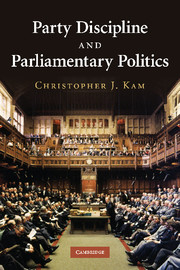Book contents
- Frontmatter
- Contents
- List of figures
- List of tables
- Acknowledgements
- 1 Introduction
- 2 A model of intra-party politics
- 3 Patterns of backbench dissent in four Westminster parliamentary systems, 1945–2005
- 4 Policy preferences and backbench dissent in Great Britain and Canada
- 5 Dissent, constituency service, and the personal vote in Great Britain and New Zealand
- 6 The cost of dissent to the party
- 7 Demotion and dissent in the Canadian Liberal Party, 1991–1997
- 8 Discipline and dissent in the Australian Coalition, 1996–1998
- 9 Career trajectories, socialization, and backbench dissent in the British House of Commons
- 10 Conclusion
- Appendix 1 Comparative statics and proofs
- Appendix 2 Content and construction of ideological scales
- Appendix 3 Sampling and coding of media dissent and discipline
- Appendix 4 Demotion and the parliamentary careers of Canadian MPs
- References
- Index
Appendix 2 - Content and construction of ideological scales
Published online by Cambridge University Press: 03 July 2009
- Frontmatter
- Contents
- List of figures
- List of tables
- Acknowledgements
- 1 Introduction
- 2 A model of intra-party politics
- 3 Patterns of backbench dissent in four Westminster parliamentary systems, 1945–2005
- 4 Policy preferences and backbench dissent in Great Britain and Canada
- 5 Dissent, constituency service, and the personal vote in Great Britain and New Zealand
- 6 The cost of dissent to the party
- 7 Demotion and dissent in the Canadian Liberal Party, 1991–1997
- 8 Discipline and dissent in the Australian Coalition, 1996–1998
- 9 Career trajectories, socialization, and backbench dissent in the British House of Commons
- 10 Conclusion
- Appendix 1 Comparative statics and proofs
- Appendix 2 Content and construction of ideological scales
- Appendix 3 Sampling and coding of media dissent and discipline
- Appendix 4 Demotion and the parliamentary careers of Canadian MPs
- References
- Index
Summary
This appendix describes the how the ideological and party loyalty scales used in Chapters 4–8 were constructed. Tables A2.1–A2.9 list the survey items that are used to create the scales used in this paper, their response categories (e.g., strongly agree, agree, neutral, disagree, strongly disagree), and the factor solutions that were used to identify the scales.
Data sources
A series of candidate surveys conducted at roughly the same time in each country provided the basic data with which to construct the ideological scales. These surveys were:
Jones, R., I. McAllister, and D. G. Gow. 1996. Australian Candidate Study, 1996 (SSDA Study No. 944). Canberra: Social Science Data Archives, The Australian National University.
Erickson, Lynda. 1993. Canadian Candidate Study, 1993. Burnaby, BC: Simon Fraser University.
Norris, Pippa and Joni Lovenduski. 1992. British Candidate Study, 1992. Available online at: http://ksghome.harvard.edu/~pnorris/Data/data.htm.
McAllister, I., Jones, R., D. Denemark, and D. G. Gow. 1994. Australian Candidate Study, 1993 (SSDA Study No. 764). Canberra: Social Science Data Archives, The Australian National University.
Norris, Pippa and Joni Lovenduski. 1997. British Representation Study, 1997. Available online at: http://ksghome.harvard.edu/~pnorris/Data/data.htm.
As many of the policy-related questions contained in the 1996 ACS were included in the 1993 ACS, I was able to use the latter surveys to obtain responses for some of the Australian MPs who did not respond to the 1996 ACS.
- Type
- Chapter
- Information
- Party Discipline and Parliamentary Politics , pp. 228 - 237Publisher: Cambridge University PressPrint publication year: 2009



